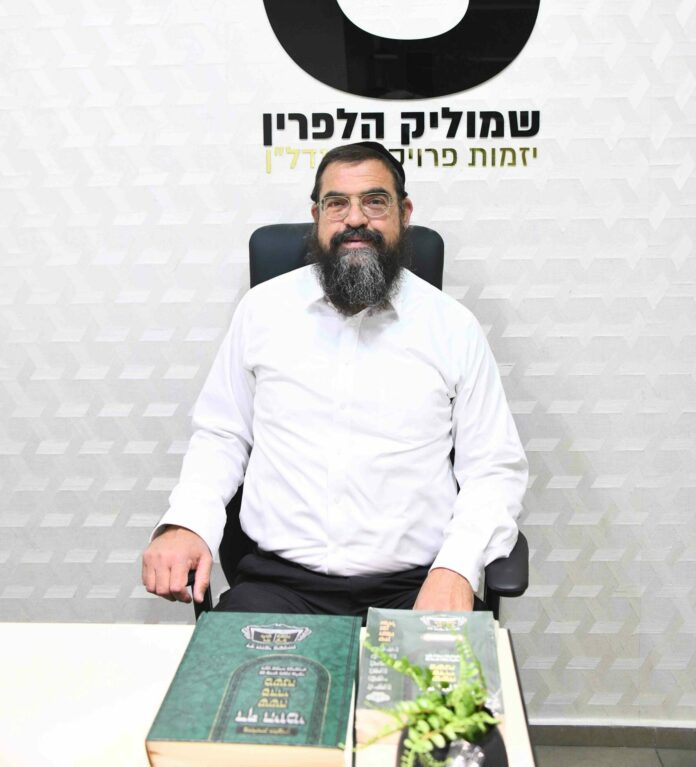Shmuel (Shmulik) Halperin is a businessman with an agenda: Daf Yomi Mishnayos—yes, Mishnayos.
Shmulik is the son of famed Israeli entrepreneur Refael Halperin, the founder of Optica Halperin, the largest chain of glasses stores in Israel. After spearheading the effort to establish branches of Optica Halperin in seemingly isolated locations in Israel, Shmulik began his venture into real estate development with a twist: as an active investor, he does not oversee the day-to-day operations.
A strategic investor who partners with developers and other real estate investors, Shmulik has become known for his business acumen and expertise in the world of Israeli real estate.
Shmulik is an energetic and engaging conversationalist, and though we spoke about business throughout our three-hour-long conversation, he kept veering off topic to discuss his biggest passion: Daf Yomi Mishnayos.
The concept is simple: The Mishnayos are divided into daily portions so that one can finish the entire Shishah Sidrei Mishnah in one year. The daily learning, which is meant to take ten to 15 minutes a day, is designed to fit onto a single daf (page), hence the term “Daf Yomi Mishnayos.”
Although there are thousands of Yidden learning Daf Yomi Mishnayos and Shmulik has printed over 20,000 sets that have been distributed and sold in Eretz Yisrael, the concept might be news to many. Before mattan Torah, it’s just the kind of news we can use.
—Nesanel
As a child, I learned in Karlin Cheder. I learned by Rav Shmuel Wosner in Zichron Meir for yeshivah ketanah, and then I learned by Rav Baruch Mordechai Ezrachi in Ateres Yisrael for yeshiva gedolah.
“My grandfather, Reb Yaakov Halperin, established the Zichron Meir neighborhood in Bnei Brak. My grandfather also gave the plot of land that would hold the future Ponovezh Yeshivah to the Ponovezher Rav, Rav Yosef Shlomo Kahaneman—he gave it away for free.
“My grandfather was very close to the Chazon Ish, and because of that, my father developed a close relationship with the Chazon Ish as well. The Chazon Ish famously didn’t use traditional electricity on Shabbos. My grandfather made the kerosene lights that he used instead.
“In his later years, my grandfather felt that his children were in good enough places financially, so he left all his money to mosdos.
“My father, Reb Rafael Halperin, was larger than life and a legend in Eretz Yisrael. He impacted the world in so many ways—it would be hard to encapsulate in a book, let alone a few sentences. He was world renowned, a serial entrepreneur, and a talmid chacham who cherished talmidei chachamim. I was recently in the Lutzk shul here in Eretz Yisrael, and I met a Yid from America named Rabbi Avraham Fruchthandler. When he discovered that I’m the son of Rafael Halperin, he got excited. He told me that he loves my father’s sefer, which is a series of stories about the Chazon Ish that he witnessed firsthand. Rabbi Fruchthandler said that if I ever reprinted it, he would purchase the first 100 copies; I’m looking into it now.
“After my marriage, I learned in Kollel Mifal HaShas in Har Nof; today we live in Bnei Brak. After a couple of years in kollel, I joined the family business, Optica Halperin. My father started the business, my older brothers soon joined, and then I got involved as well. I learned the business from my older brothers.
“At one point, I felt that we should be opening stores in locations throughout Eretz Yisrael that were without glasses stores, but several family members disagreed. So one of my brothers and I opened close to 30 new stores of our own throughout Eretz Yisrael. Eventually, my brother and I combined our stores with the family network of Optica Halperin, and together we have close to 130 Optica Halperin stores all over the country.
“Around ten years ago, I ventured into real estate, but from the get-go, I did things differently from a traditional real estate investor.
“My first venture into real estate was purchasing an empty field. I obtained permits that allowed me to build on it, and then I flipped it. In Israel, obtaining permits is not easy, and as a result, many plots of land sit undeveloped simply because the owner doesn’t have the necessary permits for building.
“After that first plot, I found a small apartment in Bnei Brak that was in bad shape. I bought it, fixed it and sold it. Slowly but surely, I became more and more involved in the world of developments. I wasn’t a kablan (contractor). I always partnered with the developer or construction company. My goal was that I would not be involved in the day-to-day running of any business.
“When I partner with a developer, I look over the deal and make sure that it makes sense. I have weekly meetings about each of my investments so that I stay in the loop with everything. But that is where my part ends. I keep my involvement with the small details to a bare minimum.
“I leave the design, marketing and legal side to my partners. Aside from the monetary investment, I also bring years of experience to the table. I’m not totally on my own. I have a personal assistant who has been working for me for over 20 years. She handles all of the paperwork and the small details of the business. I think that having the right personal assistant is the biggest game changer for a businessman, because it allows you to handle more business than you can imagine. There are many people with large companies and no personal assistant, and although they have many employees, without a personal assistant, they become overwhelmed with work that they should be delegating. The right personal assistant will ask to take work off your plate before you even ask them to do it.
“Today, my real estate focus is mostly empty lots and new developments, with the occasional renovation project. I currently have 20 projects in the works, and I dedicate three days a week to focusing solely on the business.
“Around 15 years ago, I made a big change in my life. I have always spent some time learning, grabbing a sefer here and there and having an occasional chavrusa, but nothing kavua over an extended period of time. I started learning in kollel every afternoon for several hours. The world is dead to me during my learning time, and it has changed my life.
“My true passion in life is Daf Yomi Mishnayos. After my mother passed away, I wanted to encourage people to learn Mishnayos in her memory. I came across a set of Mishnayos called Daf L’Yom, written by Rav Yisrael Cohen. I liked the concept, and I ordered 50 sets. Many people started taking upon themselves to learn Mishnayos this way, and we kept ordering more and more sets. We ended up distributing over 550 sets.
“I saw that people really took to the concept of being able to finish Mishnayos within a year, so I purchased the rights to the concept from Rav Cohen. I really liked the idea of a Daf Yomi Mishnayos, but I felt that the concept and layout needed fine-tuning. I worked with many rabbanim and found a well-accepted peirush on Mishnayos called Yefei Nof, written by Rav Aharon Blum. It is clear, concise and brings the most practical explanations based on the Bartenura in an easy-to-understand language. The peirush also includes the original words of the Mishnayos, so one can read it without having to constantly refer back to the original text. Together with a team of experts in design and typography, we put out the first sets of Daf Yomi Mishnayos under the same publishing house that released the Yefei Nof commentary.
“I found that when people heard about the concept of Daf Yomi Mishnayos, I didn’t have to convince them to learn it. I simply exposed them to the idea, and they were hooked. And I want more people to hear about Daf Yomi Mishnayos and jump on board.
“Initially, I sponsored thousands of sets so that people would receive them for free; today, I subsidize the printing so that they can be sold at close to cost price. We immediately launched three different sets: a single sefer with the entire Daf Yomi Mishnayos in one volume, a mid-size set, and a pocket-size travel set. The sets each contain 12 volumes, one for each month of the year.
“The Mishnayos are divided into a daily learning schedule so that you finish the entire Shishah Sidrei Mishnah every year. It’s close to a perek and a half each day, which takes about 15 minutes, and you can start at any point in the year. Mishnah Yomi is great, but it takes a few years to complete if you follow that schedule.
“One of the beautiful things about Daf Yomi Mishnayos is that you make a siyum on a seder of Mishnayos every few months, and that gives you a feeling of great satisfaction in your learning and motivates you to continue. We even held a Siyum HaShas Ha’olami in Elul, which was attended by many chashuve rabbanim. We have 20,000 people learning the Daf Yomi Mishnayos, and many share with me their personal stories of how it has changed their lives.”
Optica Halperin has been a popular place for people to buy glasses in Israel for a long time. How have you stayed relevant for so many years?
I think that because we have been around for so long, that in and of itself is a major reason that people come to Optica Halperin. We are a household name, and families have been coming to our stores for years. We keep our stores updated and modern, but we never lose the family-friendly vibe. Also, because we have so many locations, people know they can receive service on their frames nearly anywhere in the country. Finally, we consistently manage to offer the highest quality frames at the lowest prices.
To read more, subscribe to Ami





















